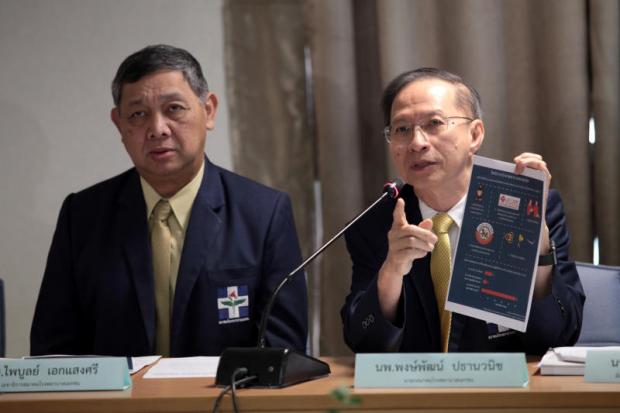
The Private Hospital Association is calling for the state to bring all public hospitals under the jurisdiction of the Medical Facilities Act of 1988 in response to the government's proposed price controls on medical services.
The move would put all hospitals under the same regulatory framework, requiring each to provide a minimum amount of physicians, paramedics and pharmacists, a costly regulation applying to private but not public hospitals.
The government's proposed price controls on medical services will limit new investment on healthcare innovations and reduce the country's competitiveness, said Dr Pongpat Patanavanich, the association's president.
"Thai private hospitals have higher medical prices for drugs and services because each hospital has to allocate such a huge investment in advanced medical devices."
He said under the Act, each hospital has to hire and provide a minimum requirement of medical staff.
"The association is calling for the related state agencies to consider and bring all public hospitals to be under the control of this Act as it wants all public hospitals to recognise their actual operation costs," said Dr Pongpat.
He said this direction will be a key obstacle for Thailand's goal to promote itself as a hub for medical tourism, with foreigners coming to Thailand seeking a mixture of high-quality services and affordable prices.
"[Private hospitals] do not get any subsidies from the government," he said. "On the contrary, public hospitals normally receive a supporting budget every year that includes funds for physicians, paramedics, supplies and devices."
Dr Pongpat, also chairman of SET-listed Mahachai Hospital, said once all hospitals are under the same regulation, financial reporting standards will move in the same direction, aiming for fairness.
"Price control is just solving the problem at end of the story, not the cause of the problem," he said.
Earlier this month, the Commerce Ministry set to put medical supplies and medical service charges on the state price control list as part of efforts to deal with price gouging.
This plan was approved on Jan 8 by the central committee on prices of goods and services, chaired by Commerce Minister Sontirat Sontijirawong.
Once approved for the price control list, state officials will be allowed to exercise power to issue measures to regulate medical supplies and medical services, such as recovery room charges, food charges, and x-ray and patient care charges.
The central committee also approved setting up a subcommittee to work out appropriate measures concerning domestic medical supplies and medical service prices.
"The ministry will go forward with this plan, but we have to open it up to all opinions from stakeholders before forwarding the proposal to be acknowledged and approved by the cabinet," said Mr Sontirat.
"The ministry stands firm that we will evaluate all impacts and launch the final measures, so this plan will be accepted by all stakeholders."

President Dr Pongpat, right, and Dr Paiboon Eksaengsi, secretary-general of the Private Hospital Association, say price controls will reduce the country's competitiveness. (Photo by Chanat Katanyu)
Dr Chalerm Harnphanich, chairman and chief executive of SET-listed Bangkok Chain Hospital Plc, said it is calling for the government to reconsider this plan carefully because Thailand's healthcare and medical industries will suffer from the price control in the long run.
Thailand's medical services come under the universal healthcare scheme for all Thais and the social security system for local employees.
"These free basic medical services are under the management of public hospitals with a budget from the government, so all schemes cover everyone," said Dr Chalerm.
"In case of an emergency the Universal Coverage for Emergency Patients plan offers compulsory emergency healthcare for up to 72 hours," he said.
The Private Hospital Association has 350 hospitals as members, more than 30,000 beds and 61.2 million patients per year.
Dr Pongpat said once the ministry completes putting medical supplies and medical service charges on the state price control list, it will not conform to the 1998 Act.
"The association sent all related documents and information to the ministry, so we want the government to reconsider the plan," he said.